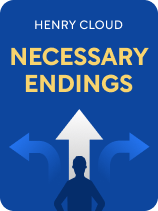

This article is an excerpt from the Shortform book guide to "Necessary Endings" by Henry Cloud. Shortform has the world's best summaries and analyses of books you should be reading.
Like this article? Sign up for a free trial here.
How do you handle difficult situations? What types of situations are worth letting go of?
When assessing difficult situations in your life, Necessary Endings by Henry Cloud says to look out for three types of negative situations. These include situations that are good but not great, mediocre situations that are unlikely to improve, and lost causes.
Below we’ve broken down the types of situations you should get out of.
End Situations That Are Good but Not Great
How do you handle difficult situations? Cloud recommends you end situations that are good, but not great. While it may seem counterintuitive to bring an end to a good situation, Cloud argues that you should only make room in your life for the situations that serve you best. When you stay in a situation that’s good but not great, you deprive yourself of the opportunity to do something that’s even better for you.
For example, suppose you’ve spent two years working at a job that you like fairly well. While it’s not in your field of interest, it’s stable, easy, and pays the bills. In other words, the job is good but not great. A great job, for you, would relate more closely to your field, pay better, and challenge you more. While that great job might be out there somewhere, you’ll never find it if you’re content to stay at your current OK job.
(Shortform note: In Essentialism, Greg McKeown refers to good-but-not-great situations as being “trivial.” McKeown argues that by cutting out these trivial situations, you free yourself up to focus on the things that truly matter to you. To cut out trivial things, McKeown asserts that you need to learn to say “no” to others. By developing strategies for saying no, such as offering delayed or gentle rejections, you’ll become more adept at ending trivial situations, giving you more time to focus on more important matters.)
End Mediocre Situations That Are Unlikely to Improve
Also aim to end situations that are mediocre and unlikely to improve. Cloud argues that it’s easy to stay in mediocre situations, telling yourself that they might someday turn around. To avoid this, objectively assess whether the situation is likely to improve. Consider past patterns, as they’re likely to predict future outcomes. As you look to the past to chart the future, take note of any recent changes that may change the outcome of the situation.
Suppose that your company sells a product that has been struggling for months. Sales of the product earn barely enough to cover costs, and you begin to consider ending production. Based on the product’s past performance, you predict that sales are unlikely to improve. As you make these predictions, you make sure to account for new factors that could change sales, such as rising or falling unemployment. However, in the end, you decide that these factors are unlikely to be very influential, and you pull the plug on the product.
(Shortform note: Psychologists note that when dealing with human beings, past patterns only predict future behaviors in certain situations. In particular, past behavior can be predictive only in identical situations that occur within a short period, without the person receiving feedback first. Outside of these criteria, past behavior isn’t a strong predictor of future behavior, as people are prone to change over time.)
End Lost Causes
Finally, end situations that are lost causes. According to Cloud, some situations are obviously beyond saving. The best thing you can do in those situations is to end them immediately, to free up resources that would be better utilized elsewhere.
For example, imagine you work at a tech company that still devotes a significant chunk of its resources to manufacturing VCRs, despite the fact that they haven’t sold well in over a decade. Your best course of action would be to end VCR production immediately, and use the budget to improve and market your other products.
Cloud notes that to identify the three types of unproductive situations, you must have clear goals in mind. If you don’t set goals and standards for your endeavors, you’ll be unable to measure whether a situation is good, great, mediocre, or a lost cause.
Suppose you open a restaurant that barely manages to break even in its first six months. Depending on your goals, you might view this outcome as either a success or failure. If your goal was for the restaurant to stay open and avoid losing money as so many new restaurants do, you’d consider the situation a great success. However, if your goal was to consistently pay your mortgage with the restaurant’s earnings, the situation is a failure.
Lastly, when assessing any situation, consider whether it depletes resources faster than it brings them in. Situations that require a large investment to produce a minimal return should be ended, as they are unlikely to be productive in the long run.
| Lost Causes and Sunk Costs The human tendency to continue investing resources into a lost cause is known as the sunk cost fallacy. In The Voltage Effect, John A. List argues that when dealing with a lost cause, it’s in your best interest to give up on the situation as quickly as possible. By giving up quickly, you save the maximum possible amount of your time, money, and energy. Along with measuring a situation against your goals for it, as Cloud suggests, List recommends considering alternative uses of the time and resources you’re currently investing in the situation. If there’s another area where those resources would produce a better return, it’s probably time to end the investment. Additionally, as you seek to end lost causes in your life, look out for diminishing returns. As List describes, diminishing returns occur when the gains you receive from a situation decrease as you invest more resources into it. Over time, this leads to a situation that depletes more resources than it brings in, as Cloud describes. |

———End of Preview———
Like what you just read? Read the rest of the world's best book summary and analysis of Henry Cloud's "Necessary Endings" at Shortform.
Here's what you'll find in our full Necessary Endings summary:
- That pulling out of a bad situation is the best way to move forward in life
- How to assess which situations and relationships need to end
- How to make sure that your endings stick






